- Home
- Diana Wynne Jones
Power of Three Page 14
Power of Three Read online
Page 14
“That—that’s perfect,” said Gerald, trying not to show his amazement. He knew how Aunt Mary hated strangers and loathed having visitors. Wondering whether he was trying her unusual hospitality too far, he added, “Brenda’s here, actually. She could help with beds and so on.”
Aunt Mary disliked Brenda and Brenda’s parents, too. But she said, “That would be a help. I suppose I’d better give the child tea in return.” Then, just as Gerald was breathing deeply and thinking that the crisis was miraculously over, Aunt Mary bobbed her head down and whispered, “Those extraordinary names! And they are so small for their ages, Gerald. But I think I see. Tea’s ready.”
Wondering wildly just what Aunt Mary thought she saw, Gerald went to fetch Brenda. Over scones round the kitchen table, it emerged that Aunt Mary thought Ayna, Gair and Ceri came from Malaysia. Brenda looked at their faces and breathed in half a scone.
While Gerald was pounding Brenda on the back, Ceri leaned back from the vibrating table and looked Aunt Mary limpidly in the eye. “I’m afraid we don’t remember Masaylia at all.”
“Malaysia!” hissed Ayna.
“Or that either,” said Ceri.
Gair looked at Gerald over Brenda’s coughing back, and they both prayed.
“Of course not, dear,” said Aunt Mary. “More tea?”
After that, Gerald took them all away upstairs to make beds as soon as he could.
“I’m sorry,” said Ayna. “Ceri never knows when to stop. I wish our aunt was as nice as yours. Did you— Garholt—?”
For a while, Gerald feared there would be a crisis of a different kind. When they heard Brenda and Gerald had actually talked with Adara, Ayna and Gair turned chalk white. Ceri sat bolt upright on Gerald’s bed with big tears rolling down his cheeks. Brenda, at the sight of him, forgot all the suspicions the Dorig had raised in her and threw both large arms round Ceri. Ceri gasped rather, but it seemed to comfort him.
“This is silly,” Ayna said shakily.
“We should be laughing,” Gair agreed. “Aunt Kasta, too!”
“The duck one?” said Gerald. Ayna nodded.
“But I don’t understand,” said Ceri. “Why can’t Mother take the words off the wells? Anyone can. I could!”
“Don’t be silly!” said Ayna. “It was pretty clever. She told the Dorig that so they wouldn’t kill them until Father comes. And she wants us to warn Father.”
“How can we, with the Dorig in the moat?” Ceri objected.
“We’ll think of something, first thing tomorrow,” Gerald promised. “What I don’t understand is why the Dorig want your wells.”
“That must be for when the Moor’s flooded,” Gair said. “Ours are the only safe wells, and I suppose the water would run out into the rest and make it all bad for the Dorig. Look—this important Giant who’s coming here. If we explain to him about the mounds, do you think he’d agree not to flood the Moor? If the Moor wasn’t filled with water, the Dorig wouldn’t want Garholt.”
“They didn’t attack Garholt because of the wells. They did it because they hate your guts,” Gerald said gruffly. “You should have heard the things they said.” He was shocked that Gair should think of telling someone like Mr. Claybury about his people, and he could see Ayna and Ceri were equally shocked. He was wondering how to explain to Gair about Civil Servants and Red Indians, when Brenda said:
“You don’t really eat caterpillars, do you?”
Ceri nodded. He was about to tell Brenda which were the good kind and where to find them, when, luckily, he saw Ayna glaring at him. He looked up into Brenda’s face and found it puckered with pink, Giant disgust. “Of course we don’t,” he said.
Gair was still thinking of Mr. Claybury. “I suppose if I did tell him,” he said, “all the Giants would want to come and look at us, wouldn’t they? I know I’d hate that, but we can’t all be drowned or sacrificed, can we? And we’ve made a start by asking you for help.”
“We’re different,” Gerald said crossly. He was annoyed with Gair for seeing so clearly and rendering his explanation useless.
A Giant machine crunched on the gravel below. Everyone surged to the window to watch Mr. Claybury and Gerald’s father arriving. Gair caught no more than a glimpse of Giant faces inside the square, sturdy machine, but that glimpse was enough to make him doubt whether he had the courage to explain about his people. Ayna and Ceri felt equally dismayed. Those faces looked more distant from them and their troubles than the Moon. The door banged. Soon they heard Aunt Mary hurrying up and down in a flurry of nervous hospitality. Brenda left the rest of them struggling with Giant sheets and blankets and dashed thunderously out. Presently, she rolled in again, beaming.
“Hey, I told your aunt my mum’ll lend me to her for a waitress this evening! I’m going to give that Mr. Claybury something to think about. You’ll see.”
“That’s right. Pour soup down his neck,” Gerald said.
Then he was called away downstairs. He came back with a dour, gloomy look Gair felt he recognized.
“My old man’s in an awful mood,” he said. “I’ll have to find you some decent clothes for supper.”
Giant cupboards with high shelves were searched. Brenda and Ayna sat on beds and altered things with big hasty stitches. This did not add to the comfort of the clothes when Gair and Ceri put them on. Ceri was particularly miserable, since he finished with a tie, over a shirt, over his double collar. It did not soothe him when Brenda pointed out that the shirt would not have fitted him otherwise. He was disgruntled and morbid and said he wished he were back in Garholt. When Ayna told him sharply that he would be a Dorig sacrifice if he were, Ceri burst into tears.
Here Gerald went away and, to Ayna’s surprise, came back with a girl’s dress. “My sister was about your size when she died,” he said gloomily. “Try it on.”
The dress was a pretty soft green. It went beautifully with Ayna’s collar and Ayna was delighted with it. While she and Brenda were admiring it and Ceri sulking, Gair seized the chance to talk to Gerald alone. “Have there been many deaths in your family?”
Gerald looked somber even for him. “My sister. And my mother died when she was born. All right,” he said angrily, before Gair could ask any more. “You’ve got some kind of feeling. Well, you’re right. Nothing ever goes right with us. We’re always miserable as sin and my father keeps losing money and Aunt Mary’s always ill. And now we’re going to be turned out to make room for drinking water. Is that what you wanted to know?”
“Yes,” said Gair. “It’s that gold collar in the desk with the false teeth.”
“Oh that!” said Gerald. Though he sounded contemptuous, Gair knew he was not. Gerald must have had traces of a feeling about the collar, too.
“You haven’t touched it, have you?” he asked anxiously.
“I—Only once,” Gerald admitted. “It felt cold as the grave. What about it?”
“It’s got a curse on it,” said Gair. “I think a very strong one. And it’s like—”
“Like your mother’s,” said Gerald. “Do you know where it comes from then?”
“No,” said Gair. “I don’t know much about either of them, but I think they may both be Dorig collars. I was hoping you’d know.”
Gerald’s large face moodily scowled. “I don’t. I could try asking my old man, I suppose, but I wouldn’t get very far—well, you’ll see soon enough.”
Chapter
11
IT WAS PROBABLE THAT NOBODY ENJOYED THE Giant supper-party that evening. Gair and Ceri certainly did not. They crowded silently behind Gerald into a tall, square room at the front of the house, with a tall, square table in the middle and a number of transparent cupboards round the walls filled with remarkably ugly painted plates. Gerald’s father, whom they had learned they were to call Mr. Masterfield, was standing in front of the unused hearth. Giants had a habit, which struck them as most uncomfortable, of going without fire in the summer months. Mr. Masterfield looked as tall and cold and dark as the empty
chimney. They had to tip their heads to see his face. It was as dark, private and proud as Gerald’s, and they could tell from the way Mr. Masterfield looked at them that they were not welcome and that Gerald had been in trouble for inviting them. That accounted for Gerald being so dour and gloomy.
“This is Mr. Claybury,” said Mr. Masterfield.
They were troubled to find Mr. Claybury a most disappointing Giant. Though he had the Giant thickness and heaviness, he was no taller than Gest. The top of his head was bald, with a tufty rim of dark hair below, and he wore two round pieces of glass, one to each eye, which enlarged and rounded the mild brown eyes underneath, until Gair was uncomfortably reminded of the staring owls of that evil collar, which he could feel all the time pulsing out its curse into the air of the house. Mr. Claybury looked trim and fussy and pleased with himself. It seemed all wrong that he should be the Giant with the power, and not the tall, cold Mr. Masterfield. He smiled at them all and said, “Hallo, nippers.”
Wondering if Giants called them Nippers the way Dorig called them Lymen, Ayna politely went to shake hands. Mr. Claybury gave her hand a firm, fussy squeeze and said, “Live near here, do you?”
“Yes,” said Gair.
“No,” said Ceri, who was beginning to think it safest to lie to Giants when he could.
Gerald’s face went red. “They’re visiting me,” he said hurriedly, and rather too loudly. Mr. Masterfield glowered at him. Gerald looked back at him defiantly. Gair saw that they did not get on with one another at all. He sighed, because it was just like himself and Gest, except that the puzzling thing was that Gerald and Mr. Masterfield were really remarkably alike. Perhaps they were too much alike for comfort.
In an awkward silence, they all sat round the tall, square table, which Ceri was appalled to find covered with strange implements and little silver containers. Aunt Mary bustled brightly in, followed by Brenda carefully carrying a tureen of soup. Aunt Mary was nervous. She chattered in a loud, high voice and forgot to finish sentences.
“This soup is very,” she said. “But I forgot to put in the. At least, up to the last minute, so I hope you’ll forgive the.”
There was a long, puzzled pause, while Brenda carried round the soup. Brenda was nervous, too. She panted loudly and wheezily, as if she had been running. Gerald and Mr. Masterfield gave her irritated looks, and Mr. Claybury craned round to see her and seemed to be wondering if she was ill. Wheeze, wheeze, wheeze, went Brenda, while Ayna, Gair and Ceri sat wondering helplessly if they were supposed to lift the steaming bowls and drink, or use one of the rows of eating-things. Gerald caught Ayna’s eye and held up a heavy, round spoon. Very relieved, they all picked up spoons and dipped them in the soup, only to find Aunt Mary frowning at them. They let the spoons go again and waited. Wheeze, wheeze, wheeze, went Brenda, endlessly. Then at last Aunt Mary and Mr. Claybury picked up spoons. Thereafter, they were careful not to do anything until Mr. Claybury had done it first.
But this awkwardness was nothing beside the awkwardness between Mr. Masterfield and Mr. Claybury. It was clear from the first that they were not getting on. But they were pretending to be friends. Mr. Masterfield turned to Mr. Claybury with a broad, comradely smile, which sat on his gloomy features as heavily as the great stone on top of Otmound, and asked him if he fished much these days.
Mr. Claybury, beaming with false friendship, shook his head. “I don’t get much time these days, Jerry old man. Too much to do with water to think of the fish in it. How about you?”
“I thought you’d remember, George,” smiled Mr. Masterfield savagely. “I never could understand your passion for fishing.”
“I’ve put those days behind me,” beamed Mr. Claybury. “A man in my position is too much in demand at the office to think of old times.”
Everything Mr. Claybury said seemed designed to point out what an important Giant he was. Every time Mr. Masterfield spoke, his smile was more of a savage grin. Gair could not help being reminded of his father and Uncle Orban, on larger, Giantly scale. The odd thing was that Mr. Claybury seemed to be the one who really had a cheerful, open nature, like Gest’s. Yet he was behaving like Uncle Orban, because Mr. Masterfield made him feel small. And Mr. Masterfield was being forced to be jolly against his nature, because he needed badly to please Mr. Claybury. But he was not pleasing Mr. Claybury. It was obvious to Gair, and Ayna, too, that Mr. Masterfield had made a mistake in asking Mr. Claybury to stay with him.
Nobody else in the dining room seemed likely to please Mr. Claybury. Aunt Mary puzzled him and Brenda’s wheezing alarmed him. Gair and Gerald were somber and subdued. Ayna looked at Ceri, hoping he could use his charm on Mr. Claybury. But Ceri felt tired to death, lost and homesick. He had burned his tongue on the soup. His collar was uncomfortable and it was as much as he could do to follow Giant table manners. So, when Mr. Claybury happened to glance her way, Ayna tried to please him herself with a rather desperate smile.
Mr. Claybury’s slow, Giant features looked first surprised, then pleased. Ayna could almost see him thinking what a relief it was to find somebody friendly at that awkward table. Then he smiled back—a natural, jolly smile. In spite of his glasses and his bald head, the smile was exactly like Gest’s. Ayna went pink with hope. Perhaps the Moor need not be flooded after all. For, if there was one thing Ayna knew how to do, it was how to get round someone like Gest.
After that, in a way, Ayna became as shameless as Ceri. She leaned forward, smiling, and asked Mr. Claybury about his work. And when Mr. Claybury protested that it was too dull to interest little girls, Ayna told him she knew it was very interesting indeed. But that was the most shameless thing she said. Mr. Claybury suddenly opened out. He smiled, he chuckled, he told a silly story about a man in his office, and, though Ayna did not understand the story very well, she found herself liking Mr. Claybury very much. She could see Gair watching her hopefully, Ceri critically and Gerald with slightly scornful admiration. Aunt Mary looked relieved, and Mr. Masterfield, after seeming at first as if he wanted to shut Ayna up, sat back and looked a little cynical. Ayna was annoyed with them all. Mr. Claybury was a kindly Giant, who liked to be friendly, and she was becoming truly fond of him. And, thanks to her understanding, by the time Brenda had finished two pints of leftover soup in the kitchen and wheezed in again with a joint of meat, she found the dining room almost gay.
Mr. Masterfield almost smiled as he fetched a bottle of wine. “Ladies first,” he said to Ayna. “Wine?”
“Yes please,” said Ayna, feeling rather flustered. She could see Mr. Masterfield was trying to show he was grateful to her, but he frightened her rather.
“Oh no, Jerry,” Aunt Mary said anxiously. “Ayna, surely your mother doesn’t allow you to drink wine?”
“Yes she does,” Ceri said, afraid of missing his share. “We all do.”
Aunt Mary looked worried. “You shouldn’t. You’re all far too small for your ages.”
Brenda let out a large, nervous wheeze. Ceri protested, “I grow all the time.”
“How old are you?” Mr. Claybury said teasingly to Ayna.
Ayna blushed. She suspected Mr. Claybury was thinking of her as a little girl, rather younger than Ceri, and she was afraid he was going to be disillusioned. “Nearly fourteen,” she admitted.
“That settles it,” said Mr. Masterfield, and he poured Ayna some wine in spite of Aunt Mary’s frown.
Mr. Claybury, to Ayna’s relief, threw back his bald head and laughed. “Would you believe it!” he said. “You’re the same age as my little niece!” It was plain he thought his niece was wonderful, so that, Ayna thought thankfully, was all right. “And here was I thinking you were a bit young to be trusted with that great gold necklace of yours!” Mr. Claybury said, pointing to Ayna’s collar. His face became thoughtful. Slow, Giant memories came into it. “I know what it’s been reminding me of.” He looked at Mr. Masterfield. “Jerry old man, do you still have that gold collar that funny little fellow gave us for shifting that stone?”
/> Gair’s heart bumped. He avoided looking at Ayna’s and Ceri’s startled, troubled faces, and looked at Mr. Masterfield instead. His face was blank, bitter and crafty. “What on earth are you talking about, George?” he said. Gair felt the pulsing of the collar strongly as he said it. It was working to make Mr. Masterfield cheat and lie, perhaps even kill, to keep the thing which could only do him harm.
Mr. Claybury’s face became less pleasant, too. “Maybe you don’t remember,” he said. “You were very drunk. But I’d like to know what became of that collar. It was half mine, after all.”
“I’ve no idea,” Mr. Masterfield said flatly, and went round the table with the wine. Mr. Claybury’s mouth pursed up and he looked almost murderously at Mr. Masterfield’s back. It was only too clear to Gair that the collar had destroyed any friendship there had been between them.
Gerald took a deep breath. “I think I know the collar you mean, Mr. Claybury. It’s in the study.” Mr. Masterfield whirled round and glared at him, and Gair was not the only one who held his breath.
“There is a gold torque in the study,” Aunt Mary said nervously. “Torque is the word, Gerald. A very fine one.”
Mr. Claybury laughed and drank some wine. “I think I’ll tell you a story,” he said suddenly.
“How kind,” Aunt Mary said uncertainly.
“The nippers’ll like it anyway,” said Mr. Claybury. “It starts on a fine moonlit night, years ago. There were two young men called—well, let’s call them Jerry and George, shall we? They had just come down from Oxford and Jerry was to be married the next day. George was going to be best man. And, the night before the wedding, the night I’m talking about, these two proceeded to get unbelievably, monstrously, extravagantly drunk—so drunk that they were never quite sure afterward what really happened. However, they did distinctly remember going to a farm called Marsh End—”
Brenda gasped from beside the sideboard. “My Auntie Marianne lives there!”
“Does she?” said Mr. Claybury. “She was a very comely young lady.” After that, he turned his chair to include Brenda as he told his story, and much of his good humor seemed to return. Gair kept an eye on Mr. Masterfield and thought he had seldom seen anyone, Giant or person, look more dangerous. He hoped Mr. Claybury knew what he was doing. “These young men,” Mr. Claybury said, “rollicked all over the Moor, and several times returned to sing songs under your auntie’s window. And then, somehow, they ended up at a place where three roads met, on one of those little triangles of grass. There was a signpost there, and without that signpost they would have fallen down. They were as drunk as that. Shall I go on?”

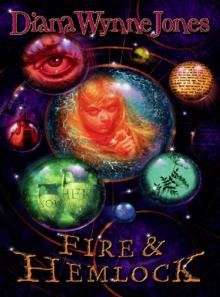 Fire and Hemlock
Fire and Hemlock Reflections: On the Magic of Writing
Reflections: On the Magic of Writing The Game
The Game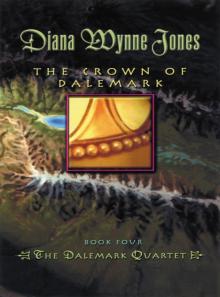 The Crown of Dalemark
The Crown of Dalemark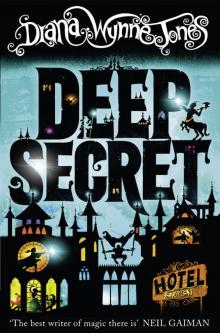 Deep Secret
Deep Secret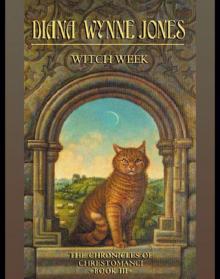 Witch Week
Witch Week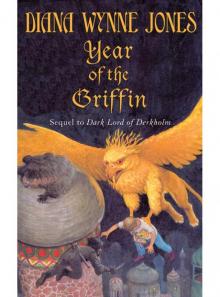 Year of the Griffin
Year of the Griffin Wild Robert
Wild Robert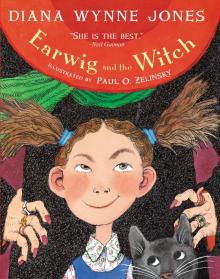 Earwig and the Witch
Earwig and the Witch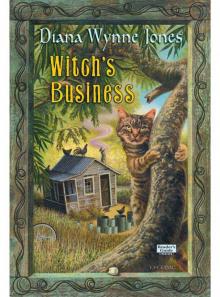 Witch's Business
Witch's Business Dogsbody
Dogsbody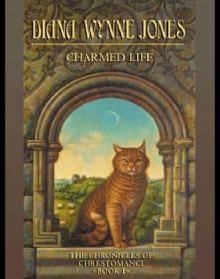 Caribbean Cruising
Caribbean Cruising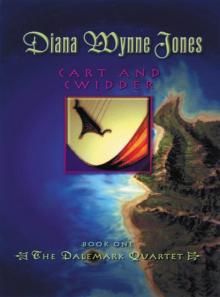 Cart and Cwidder
Cart and Cwidder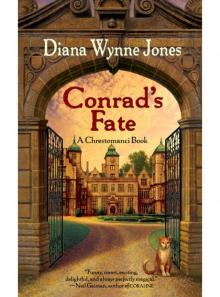 Conrad's Fate
Conrad's Fate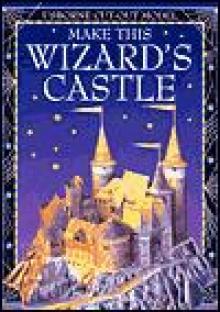 Howl's Moving Castle
Howl's Moving Castle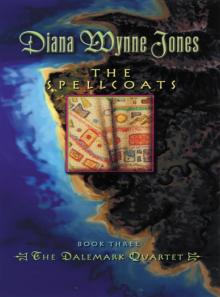 The Spellcoats
The Spellcoats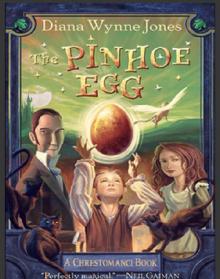 The Pinhoe Egg
The Pinhoe Egg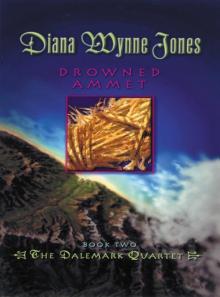 Drowned Ammet
Drowned Ammet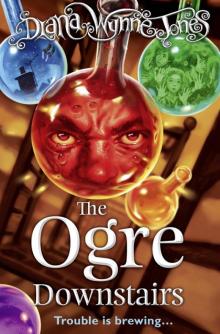 The Ogre Downstairs
The Ogre Downstairs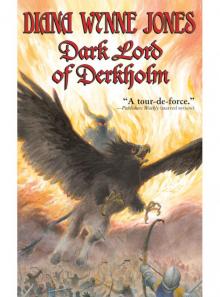 Dark Lord of Derkholm
Dark Lord of Derkholm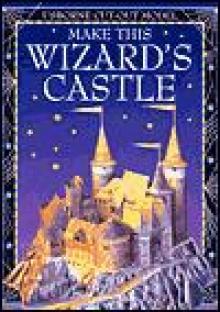 Castle in the Air
Castle in the Air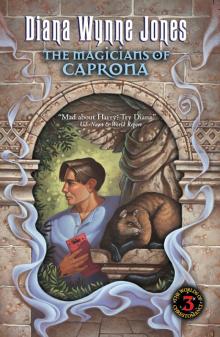 The Magicians of Caprona
The Magicians of Caprona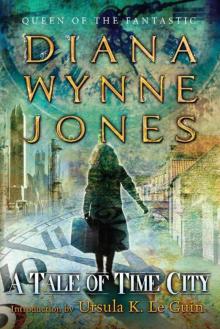 A Tale of Time City
A Tale of Time City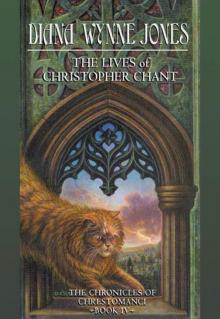 The Lives of Christopher Chant
The Lives of Christopher Chant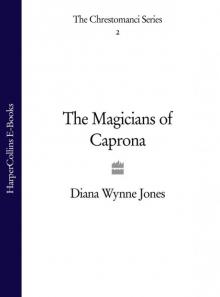 The Magicians of Caprona (UK)
The Magicians of Caprona (UK)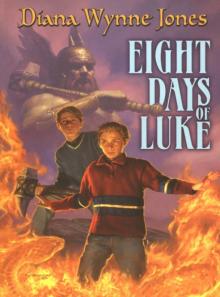 Eight Days of Luke
Eight Days of Luke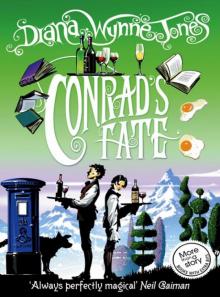 Conrad's Fate (UK)
Conrad's Fate (UK)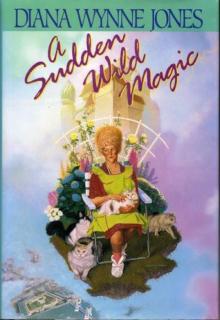 A Sudden Wild Magic
A Sudden Wild Magic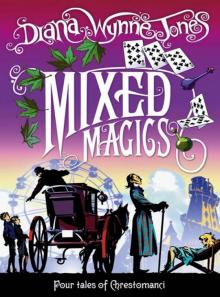 Mixed Magics (UK)
Mixed Magics (UK)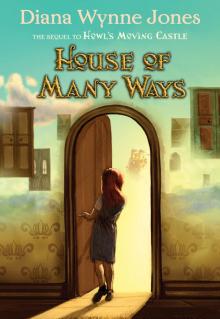 House of Many Ways
House of Many Ways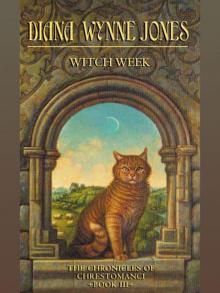 Witch Week (UK)
Witch Week (UK)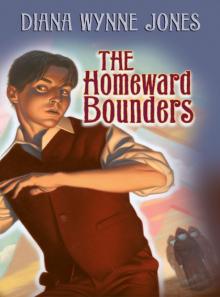 The Homeward Bounders
The Homeward Bounders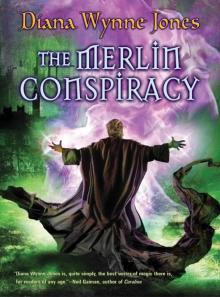 The Merlin Conspiracy
The Merlin Conspiracy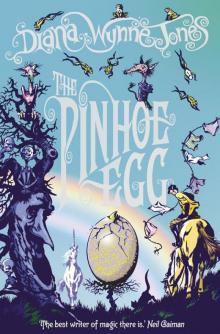 The Pinhoe Egg (UK)
The Pinhoe Egg (UK)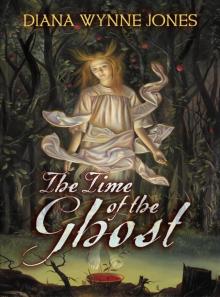 The Time of the Ghost
The Time of the Ghost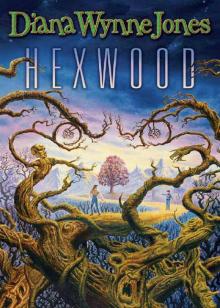 Hexwood
Hexwood Enchanted Glass
Enchanted Glass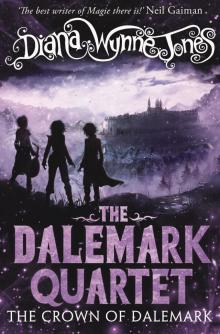 The Crown of Dalemark (UK)
The Crown of Dalemark (UK)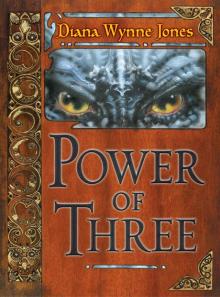 Power of Three
Power of Three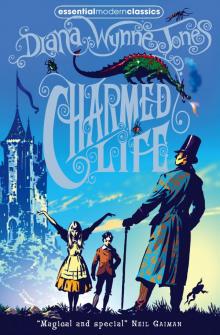 Charmed Life (UK)
Charmed Life (UK)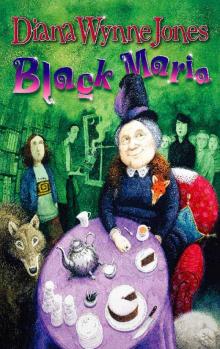 Black Maria
Black Maria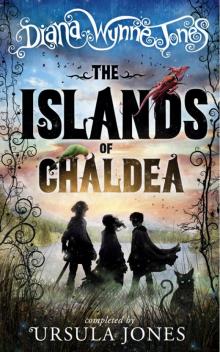 The Islands of Chaldea
The Islands of Chaldea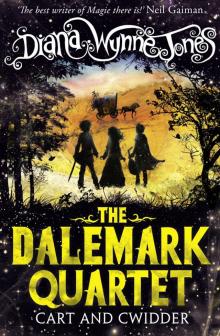 Cart and Cwidder (UK)
Cart and Cwidder (UK)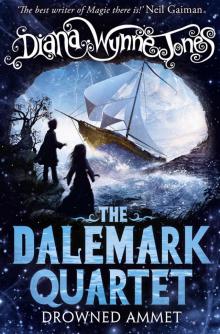 Drowned Ammet (UK)
Drowned Ammet (UK)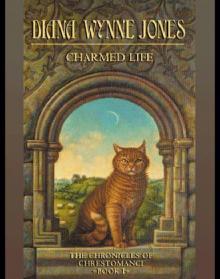 Charmed Life
Charmed Life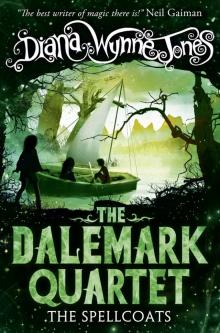 The Spellcoats (UK)
The Spellcoats (UK)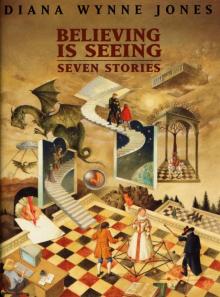 Believing Is Seeing
Believing Is Seeing Samantha's Diary
Samantha's Diary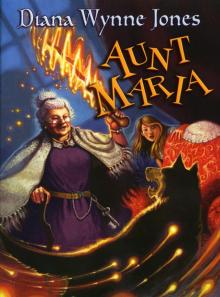 Aunt Maria
Aunt Maria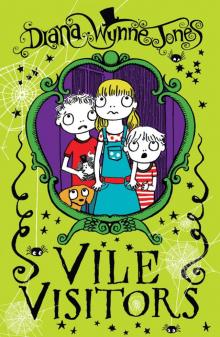 Vile Visitors
Vile Visitors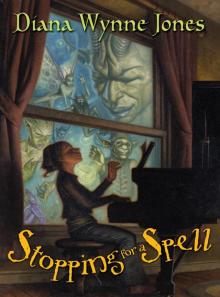 Stopping for a Spell
Stopping for a Spell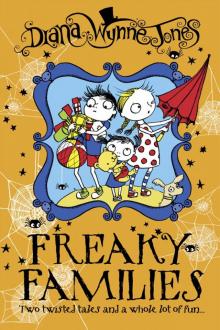 Freaky Families
Freaky Families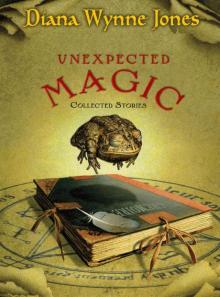 Unexpected Magic
Unexpected Magic Reflections
Reflections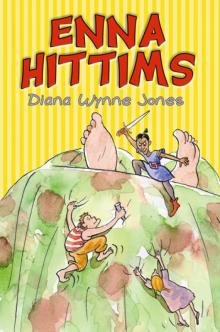 Enna Hittms
Enna Hittms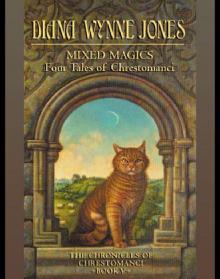 Mixed Magics: Four Tales of Chrestomanci
Mixed Magics: Four Tales of Chrestomanci